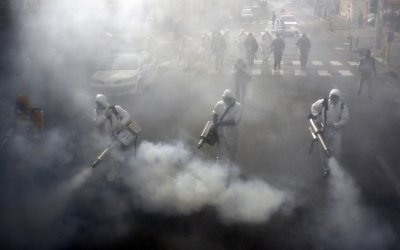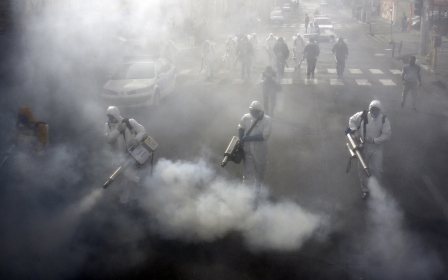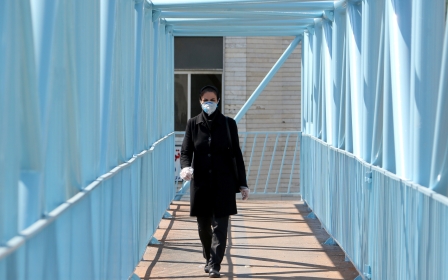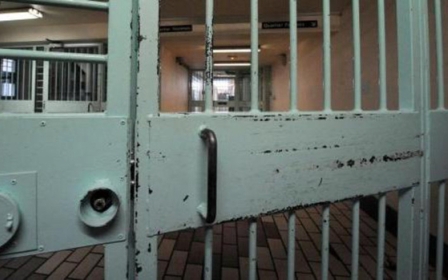Coronavirus: France, Germany and UK begin exporting medical gear to Iran

France, Germany and the United Kingdom have delivered medical gear to Iran to help fight coronavirus there, in the first transaction conducted under the Instex trading mechanism, the German government said on Tuesday.
The delivery comes as Iran grapples with one of the worst outbreaks of the novel coronavirus globally, announcing on Tuesday a death toll of 2,898 people and a total of 44,606 infections.
"In the past 24 hours, there have been 3,111 new cases of infected people. Unfortunately, 3,703 of the infected people are in a critical condition," health ministry spokesman Kianush Jahanpur said in a TV statement.
The Instex trading mechanism was created by the three European countries following Washington's withdrawal from the 2015 nuclear deal with Iran in May 2018, with the purpose of evading US sanctions on Tehran.
Last week, the US imposed a new set of sanctions against Iran, despite pleas from key members of Congress and world powers that Washington ease its unilateral sanctions, as Iran struggles to cope with the rapidly spreading virus.
New MEE newsletter: Jerusalem Dispatch
Sign up to get the latest insights and analysis on Israel-Palestine, alongside Turkey Unpacked and other MEE newsletters
The Instrument in Support of Trade Exchanges (INSTEX)
+ Show - HideOn 28 June, Britain, France and Germany (E3 countries) announced that The Instrument in Support of Trade Exchanges (INSTEX) was up and running.
Instex is a special-purpose vehicle (SPV) established by the E3 countries in January 2019 to facilitate international trade with Iran after the United States unilaterally withdrew from the 2015 nuclear agreement and re-imposed economic sanctions on Iran.
The mechanism is designed to salvage the agreement, also known as the Joint Comprehensive Plan of Action, by ensuring that Iran continues to abide by its commitments to curb its nuclear enrichment program.
The nuclear deal was reached under former President Barack Obama, with China, France, Russia, the United Kingdom, the United States, Germany, and the European Union as its signatories.
Based in Paris, France, the mechanism avoids use of U.S. dollars.
The mechanism allows European and Iranian companies to send and receive money within their borders, thus allowing the flow of commodities while avoiding overseas financial transactions that could be affected by US sanctions.
In April, Iran established the Special Trade and Finance Institute as the local parallel of the European Instex.
Ali Vaez, Director of the Iran Project at the International Crisis Group, told Middle East Eye:
“At this stage, the only way Europe can prevent further deterioration of the crisis with Iran, which was entirely manufactured by the Trump administration, is for INSTEX to become fully operational. And the easiest path to achieve this objective is for the E3 to inject billions of Euros worth of export credit into it and for more EU states to join in.”
“Investment by sovereign states into INSTEX could help alleviate Europe's private sector concerns and deter the U.S. from targeting the mechanism, which initially will focus on humanitarian trade that is exempt from US sanctions.”
“If Europe's investment in INSTEX comes to naught, Europe will have nearly zero leverage to de-escalate tensions between Tehran and Washington.”
Marco Carnelos, a former Italian diplomat and Middle East Eye columnist, said:
“It’s already too late for the EU to do anything to minimise the impact of US sanctions on Iranian economy.”
“The biggest stumbling block for Instex is the behaviour of the banks. So far, the majority of banks in the world are not ready to run any risk in continuing to facilitate business with Iran because they are afraid of the reaction of the U.S. treasury. No western or major bank is ready to be listed by the American treasury.”
The European Union announced in June that the mechanism, known as “the special purpose vehicle”, had come into effect.
Instex allows all EU member states to conduct small trade with Iran, particularly with humanitarian products.
The mechanism allows European and Iranian companies to send and receive money within their borders, thus allowing the flow of commodities while avoiding overseas financial transactions that could be affected by US sanctions.
In April, Iran established the Special Trade and Finance Institute as its equivalent to Instex.
On Tuesday, the German foreign ministry said that a first export of medical goods had been delivered, adding that the trade mechanism will allow more transactions with Iran in the future.
"Now that the first transaction is complete, Instex and its Iranian counterpart STFI will work on more transactions and enhance the mechanism," the German government said.
Britain, France and Germany were among countries that sent Iran medical aid earlier this month.
US sanctions have complicated Iran’s efforts to contain the epidemic, which has killed over 38,000 people around the world.
Middle East Eye delivers independent and unrivalled coverage and analysis of the Middle East, North Africa and beyond. To learn more about republishing this content and the associated fees, please fill out this form. More about MEE can be found here.





